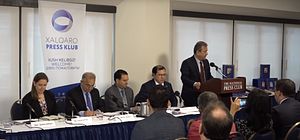On May 14, in the National Press Club’s First Amendment Room overlooking a cloudy but warm day in Washington, DC, a diverse panel discussed various aspects of Uzbekistan’s human rights situation. Uzbek officials sat beside human rights activists, academics beside Uzbek NGO leaders in an event few could have imagined two years ago.
A few days after the 13th anniversary of the Andijan massacre, a journalist with Voice of America asked the first deputy chairman of the Senate of the Oliy Majlis, Uzbekistan’s parliament, Sodiq Safoyev, about how the administration of Shavkat Mirziyoyev planned to approach the issue differently. Director of the Uzbek National Human Rights Center, Akmal Saidov, faced difficult questions from representatives of Freedom Now, an NGO which advocates for the release of political prisoners, and the Cotton Campaign, which pushes for the elimination of forced labor in the Uzbek cotton industry.
In the not so distant past, Uzbek officials usually responded to such questions — touching on deeply sensitive topics — with denials and diversions.
For example, in 2013 Uzbekistan, in its second cycle of the Universal Periodic Review process at the United Nations Human Rights Council, flatly denied that there were political prisoners in Uzbekistan.
“There are no political prisoners in Uzbekistan. Those ‘journalists’ and ‘human rights defenders’ who are in prison have been sentenced for acts prohibited by the Criminal Code,” the country’s response read.
Fast forward to 2018, Saidov was fresh from Geneva, and Uzbekistan’s third cycle of UP. He (and the other Uzbek officials in attendance) spoke in terms of progress, problems, challenges and change. Saidov mentioned the difficult but necessary work ahead to not only bring Uzbekistan’s laws into line with international standards but to narrow the gap between the law as written, and the law as practiced. “We must bring closer the law in books and the law in action,” he said.
Sitting beside him, Human Rights Watch’s Steve Swerdlow held up a 2014 report the group had released on political prisoners in Uzbekistan. Swerdlow noted that, with the latest releases, of the 30-something cases outlined in the 2014 report, most have been released. According to Swerdlow, about 28 political prisoners have been released in the last 20 months. For the first time in more than two decades there are no journalists sitting in Uzbek prisons.
In his remarks, Safoyev argued that genuine change is in progress in Uzbekistan, propelled by two factors: the necessity to undergo political transformation in order to guarantee stability and manage threats, such as those from extremism, and simple demand. Uzbekistan’s large and youthful population, he noted, want to live in a democratic state. When queried about what the country’s legislature can and will do, Safoyev commented that he expects there to be new faces in the parliament next year after elections. An infusion of new blood in the government is an exciting prospect.
Chairman of the International Press Club in Tashkent, Sherzod Kudratkhodjaev, spoke of hosting government officials for lively debates and Firdaus Abdukhalikov, chairman of the board of the National Association of Electronic Mass Media discussed the role of NGOs and the importance of the active participation of Uzbek citizens in society. Across the panel, the mood was one of hope and ambition. Director of George Washington University’s Central Asia Program Marlene Laruelle discussed Uzbekistan’s opening in academic terms: academics filing for grants to go to Uzbekistan and carry forward their research and the burgeoning possibilities for partnerships and exchanges.
Tashkent, in the 27 years of its independence, has sunk to the bottom rungs of rankings like Reporters Without Borders (RSF)’s World Press Freedom Index and Freedom House’ annual Nations in Transit report. But whereas most of the Eurasian region seems to be sinking deeper into authoritarianism, Uzbekistan shows signs of moving in the opposite direction.
Uzbekistan has a long road ahead, but it seems none deny that now. The acknowledgement of challenges allows Tashkent to fully embrace partners in improvement from national partners — like the United States, which will host President Shavkat Mirziyoyev this week — to nongovernmental partners like Human Rights Watch and the Cotton Campaign.

































